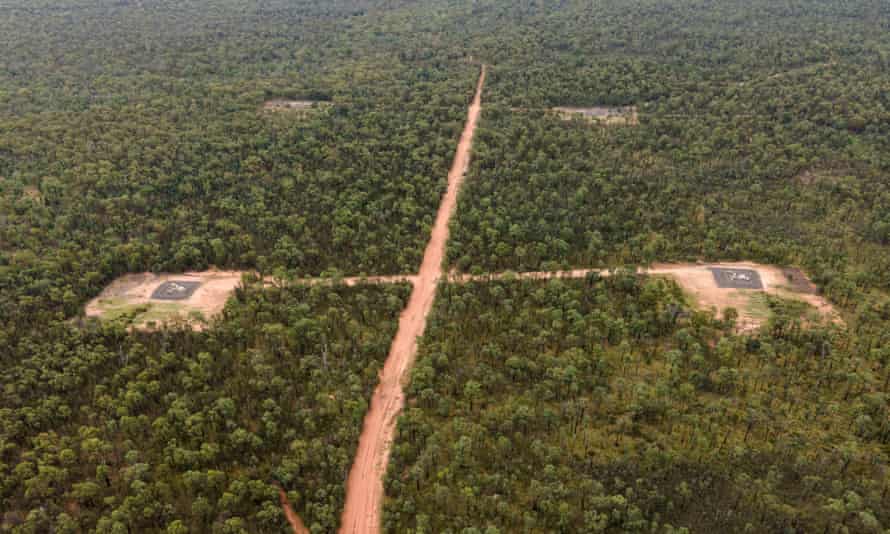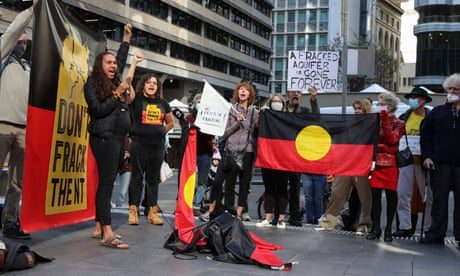Extract from The Guardian
Traditional owners and farmers are fighting for their land while their own government bankrolls the companies mining it.

Last modified on Sat 14 Aug 2021 10.20 AEST
For many of us, the mention of “the Kimberley” or “the outback” conjures up images of iconic, ancient Australian landscapes. Red soil, endless plains, rugged ranges and spectacular gorges. It is also home to the world’s oldest living cultures. An ancient landscape inhabited for over 50,000 years, maybe closer to 100,000. That long living in a landscape, having a relationship with a place, is almost impossible to comprehend for an immigrant like myself. It’s no surprise that First Nations people are leading the battle to protect their land; to protect this incredible continent of beauty and wonder we are lucky enough to call home.
New gas projects threaten vast tracts of country and communities across Australia – from Western Australia’s stunning Kimberley to the Northern Territory’s Beetaloo and New South Wales’s Pilliga forest. A recent analysis revealed a single fracking company cleared so much native vegetation for geological seismic testing in the Kimberley that, if it was assembled in a straight line, it would be a road that stretched from Perth to London. Last week, traditional owners from the heart of the Northern Territory were in tears during a Senate inquiry into the Morrison government’s use of taxpayer funds to prop up the economically questionable forays of the fracking industry into the Beetaloo.

Across Australia, oil and gas companies are getting ready to develop new fossil fuel projects, spurred on by the Australian government’s now widely discredited “gas-led recovery”. In some parts of the bush, the damage is already under way. From west of about Dalby to Roma in Queensland, and north to the edge of the spectacular Carnarvon Gorge national park, many thousands of gas wells pockmark the landscape. While the damage this industry has inflicted on the surface is clear, it has also befouled and drained precious water. The aquifers deep below the ground have suffered – water levels have declined by up to 250 metres in the immediate vicinity of coal seam gas (CSG) production. This has meant that many hundreds of water bores used for farming have been drained, and many more are expected to dry up as the CSG industry marches on relentlessly.
To avert the worst-case climate change scenarios, we must significantly reduce emissions this decade, and new fossil fuel projects like gas fields make that impossible. They are incompatible with a living Great Barrier Reef and a middle finger to the federal court ruling that politicians have a duty of care to protect young Australians from climate harm. Yet the Morrison government is subsidising these new fossil fuel projects to help make them happen. The gas industry will skyrocket our emissions just at the time we need to be lowering them. The Beetaloo alone could produce the equivalent of 22% of Australia’s current annual emissions. Even the employment arguments don’t stack up. The gas industry is notorious for employing few people compared with other large industries.
What we’re now seeing is billion dollars’ worth of public money being thrown at fracking and CSG projects against the wishes of First Nations groups, local communities and farmers. We’re seeing the government ram through $600m in taxpayer money for a gas power station. That’s not to mention the casual millions thrown at gas pipeline projects and at failed technology like carbon capture and storage.

Gas mining hurts our land and water, and that’s bad news for the people who live near these sites. It’s communities who are paying the price. It’s the damage being done to these communities and our collective future that led to me joining the board of the Lock the Gate Alliance. It is a network of many thousands of people – traditional owners, farmers, rural and urban citizens – horrified by what is happening to our country. I’ve spoken to farmers and community members who have found themselves having to fight for their land as the gas corporations roll into town. And to add insult to injury, it’s now bankrolled by their own tax dollars.
It doesn’t have to be like this. We can choose a better future for all of us. New gas developments in Australia are dangerous and unnecessary. As one of the sunniest, windiest countries on earth, we have all the resources we need to move away from these old fuels and build the economy of the future, creating more jobs and more prosperity for Australians.
No comments:
Post a Comment